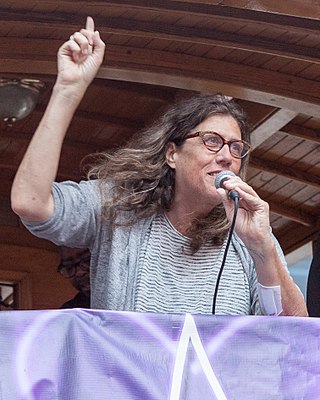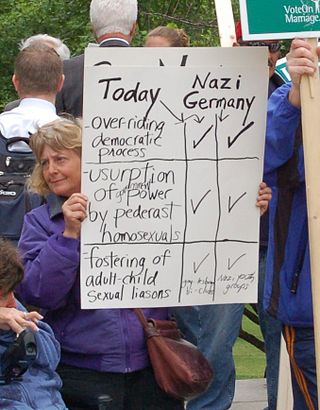Related Research Articles
Gender studies is an interdisciplinary academic field devoted to analysing gender identity and gendered representation. Gender studies originated in the field of women's studies, concerning women, feminism, gender, and politics. The field now overlaps with queer studies and men's studies. Its rise to prominence, especially in Western universities after 1990, coincided with the rise of deconstruction.
A cisgender person is someone whose gender identity corresponds to their sex assigned at birth, i.e., someone who is not transgender. The prefix cis- is Latin and means on this side of. The term cisgender was coined in 1994 as an antonym to transgender, and entered into dictionaries starting in 2015 as a result of changes in social discourse about gender. The term has been and continues to be controversial and subject to critique.
Queer theory is a field of post-structuralist critical theory that emerged in the early 1990s out of queer studies and women's studies. The term "queer theory" can have various meanings depending upon its usage, but has been broadly associated with the study and theorization of gender and sexual practices that exist outside of heterosexuality, and which challenge the notion that heterosexual desire is "normal". Following social constructivist developments in sociology, queer theorists are often critical of what they consider essentialist views of sexuality and gender. Instead, they study those concepts as social and cultural phenomena, often through an analysis of the categories, binaries, and language in which they are said to be portrayed.
Women's studies is an academic field that draws on feminist and interdisciplinary methods to place women's lives and experiences at the center of study, while examining social and cultural constructs of gender; systems of privilege and oppression; and the relationships between power and gender as they intersect with other identities and social locations such as race, sexual orientation, socio-economic class, and disability.
Disability studies is an academic discipline that examines the meaning, nature, and consequences of disability. Initially, the field focused on the division between "impairment" and "disability", where impairment was an impairment of an individual's mind or body, while disability was considered a social construct. This premise gave rise to two distinct models of disability: the social and medical models of disability. In 1999 the social model was universally accepted as the model preferred by the field. However, in recent years, the division between the social and medical models has been challenged. Additionally, there has been an increased focus on interdisciplinary research. For example, recent investigations suggest using "cross-sectional markers of stratification" may help provide new insights on the non-random distribution of risk factors capable of acerbating disablement processes.
Sheila Jeffreys is a former professor of political science at the University of Melbourne, born in England. A lesbian feminist scholar, she analyses the history and politics of human sexuality.
Nikita James Nanos is a Canadian public opinion pollster, entrepreneur, public speaker, author, and expert in political, business and social trends.

Susan O'Neal Stryker is an American professor, historian, author, filmmaker, and theorist whose work focuses on gender and human sexuality. She is a professor of Gender and Women's Studies, former director of the Institute for LGBT Studies, and founder of the Transgender Studies Initiative at the University of Arizona, and is currently on leave while holding an appointment as Barbara Lee Distinguished Chair in Women's Leadership at Mills College. Stryker serves on the Advisory Council of METI and the Advisory Board of the Digital Transgender Archive. Stryker, who is a transgender woman, is the author of several books about LGBT history and culture. She is a leading scholar of transgender history.
Amber L. Hollibaugh was an American writer, filmmaker, activist and organizer concerned with working class, lesbian and feminist politics, especially around sexuality. She was a former Executive Director of Queers for Economic Justice and was Senior Activist Fellow Emerita at the Barnard Center for Research on Women. Hollibaugh proudly identified as a "lesbian sex radical, ex-hooker, incest survivor, gypsy child, poor-white-trash, high femme dyke."
Mary Jean Alexandra Fulbrook, is a British academic and historian. Since 1995, she has been Professor of German History at University College London. She is a noted researcher in a wide range of fields, including religion and society in early modern Europe, the German dictatorships of the twentieth century, Europe after the Holocaust, and historiography and social theory.
Despite the history of colonisation and the resulting process of Westernisation since 1842, Hong Kong still embodies many aspects of Chinese traditional values towards sexuality. It is traditionally believed that heterosexuality is the nature, coherent, and privileged sexuality. Popular media marginalises and discriminates against LGBT members of Hong Kong in an attempt to maintain "traditional lifestyles".
Matt Cook is a social and cultural historian specializing in LGBTQ and queer history. Since October 2023, he has served as the Jonathan Cooper Chair of the History of Sexuality at Mansfield College, Oxford University. The appointment makes him the UK's first professor of LGBTQ+ history.

Stella Nyanzi is a Ugandan human rights advocate, poet, medical anthropologist, feminist, queer rights advocate, and scholar of sexuality, family planning, and public health. She was arrested in 2017 for insulting the Ugandan president. In January 2022, she was accepted to live in Germany on a writers-in-exile programme run by PEN Germany, with her three children.

Jan Zbigniew Grabowski is a Polish-Canadian professor of history at the University of Ottawa, specializing in Jewish–Polish relations in German-occupied Poland during World War II and the Holocaust in Poland.

There is a widespread and long-lasting myth alleging that homosexuals were numerous and prominent as a group in the Nazi Party or the identification of Nazism with homosexuality more generally. It has been promoted by various individuals and groups from before World War II through the present, especially by left-wing Germans during the Nazi era and the Christian right in the United States more recently. Although some gay men joined the Nazi Party, there is no evidence that they were overrepresented. The Nazis harshly criticized homosexuality and severely persecuted gay men, going as far as murdering them en masse. Therefore, historians regard the myth as having no merit.
Anna Hájková is a Czech-British historian who is currently a faculty member at the University of Warwick. She specializes in the study of everyday life during the Holocaust and sexuality and the Holocaust. According to Hájková, "My approach to queer Holocaust history shows a more complex, more human, and more real society beyond monsters and saints."
Marion Kaplan is Skirball Professor of Modern Jewish History at New York University. She is a three-time winner of the National Jewish Book Award for her non-fiction writing about German-Jewish history, Jewish refugees, and Holocaust history. Established in 1950, these awards recognize outstanding achievement in Jewish writing and research.
Laurie Marhoefer is a historian of queer and trans politics who is employed as the Jon Bridgman Endowed Professor of History at the University of Washington. In January 2021, together with Jennifer V. Evans, they facilitated the Jack and Anita Hess Research Seminar at the United States Holocaust Memorial Museum on LGBTQ+ histories of the Holocaust.
Deborah Kamen is Chair and Professor of Classics at the University of Washington. Her research is on Greek cultural and social history, with a particular focus on ancient slavery.

Transgender genocide or trans genocide is a term used by some scholars and activists to describe an elevated level of systematic discrimination and violence against transgender people.
References
- ↑ "History Professor Jennifer Evans Elected to the Royal Society's College of New Scholars, Artists and Scientists". Carleton University. Retrieved 13 July 2021.
- ↑ "History in Public Interest Update from Royal Society of Canada Truth and Reconciliation Task Force" . Retrieved 13 July 2021.
- ↑ "Why Canada Should Protect Gender Identity". Washington Post. December 2010. Retrieved 15 July 2021.
- ↑ "US History is a Pandora's Box". The Guardian. 8 August 2017. Retrieved 15 July 2021.
- ↑ "Folk Devils and Fear: Q Anon Feeds into a Culture of Moral Panic". National Post. National Post. 26 October 2020. Retrieved 15 July 2021.
- ↑ "Why Social Media Sites Shouldn't Censor Erotic Images". Washington Post. Retrieved 15 July 2021.
- ↑ "Can Remembering Past Atrocities Stop Future Ones?". Washington Post. Retrieved 15 July 2021.
- ↑ "2020 CPU Nationals, Winnipeg, MB". Canadian Powerlifting Union. CPU. Retrieved 13 July 2021.
- ↑ "2019 CPU Nationals, Ottawa, ON". Canadian Powerlifting Union. CPU. Retrieved 13 July 2021.
- ↑ "Carleton History Professor Wins Medals at Powerlifting Nationals". Carleton University. Carleton University. Retrieved 13 July 2021.
- ↑ Hubbard, Phil (2013). Cities and Sexualities. Taylor & Francis. pp. 8, 41.
- ↑ Fenemore, Mark (October 2012). "Review: Life among the Ruins: Cityscape and Sexuality in Cold War Berlin". The American Historical Review. 117 (4): 1315. doi:10.1093/ahr/117.4.1315 . Retrieved 13 July 2021.
- ↑ Queer Paths Through Queer Libraries https://cuag.ca/event/queer-paths-through-queer-libraries-benny-nemerofsky-ramsay-and-jennifer-evans-in-conversation/
- ↑ Chervel, Thierry. "Historikerstreit 2.0, zweiter Teil". perlentaucher Das Kulturmagazin. Retrieved 13 July 2021.
- ↑ "The German Catechism". Geschichte der Gegenwart. Retrieved 14 July 2021.
- ↑ Beckett, Lois (November 2020). "Scholars warn of collapse of democracy as Trump v Biden election looms". The Guardian. Retrieved 13 July 2021.
- ↑ Neal, Alan. "Scholars call on citizens to defend democracy". CBC – All in a Day. CBC. Retrieved 13 July 2021.
- ↑ "German Studies Collaboratory" . Retrieved 13 July 2021.
- ↑ Stiftung, Max Weber. "Collaboration + Laboratory = The German Studies Collaboratory". TRAFO Transregionale Forschung. Blog For Transregional Research. TRAFO. Retrieved 15 July 2021.
- ↑ Populist Publics: Memory, Populism, and Misinformation in the Canadian Social Mediascape https://carleton.ca/populistpublics/
- ↑ "Dr. Jennifer Evans". All Fellows and Scholars. United States Holocaust Memorial Museum. Retrieved 15 July 2021.
- ↑ "Fondation de Maison de l'Homme". 4 May 2018. Retrieved 14 July 2021.
- ↑ "Humboldt Foundation". 13 May 2023. Retrieved 15 May 2023.
- ↑ Jack and Anita Hess Research Seminar https://www.ushmm.org/research/opportunities-for-academics/faculty-seminars/hess/2021
- ↑ "Lessons and Legacies". Holocaust Educational Foundation . Retrieved 14 July 2021.